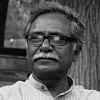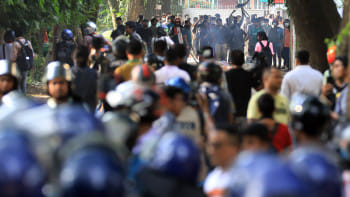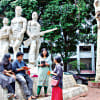The government must stop harassing the youth

Over the last few days, we went through an unexpected, uncertain, and cruel experience. It felt as though we were living in very disturbing times—the students and citizens on the one end and the government on the other. The problem that fuelled the frustration among people was avoidable. The government showed us how to take a solvable problem and make it complicated—how to increase people's anger and frustration.
The resistance was increasing on par with the viciousness of the attacks. We saw a multitude of student sections join in later as the attacks increased. First we saw it begin at public universities and public colleges. When these students came under attack, we saw the private universities join in. Then we saw the colleges and even many school students join in. As the attacks became more and more violent, the courage of the protesters continued to increase as well.
The first action taken to stop the protests was vacating the student residential halls at the universities. Law enforcement members, along with Chhatra League and Jubo League, ran the operation to forcibly remove students from their halls and campuses. There is a good number of students in Bangladesh who live in rented homes near their educational institutions. Chhatra League and Jubo League activists even went to their homes and forced them to leave. Some students that I know, who study in Chattogram, were made to leave like this and when they tried to go back to their homes, the curfew had already started. So they were stranded on the roads with nowhere to go. These kinds of stories are abundant.
I taught at Jahangirnagar University for 40 years. The university campus is filled with lakes and trees. I am used to seeing students roaming around on their beautiful campus surrounded by nature. But on TV, I had to see the same campus streets filled with big police cars and armoured vehicles. I saw law enforcers firing tear shells and sound grenades. They were firing guns on that campus. The students were trying to hide in bushes! The teachers were also trying to save themselves from the attacks. The sound of birds chirping and students' conversations and laughter were replaced with the sounds of gunshots and sound grenades. This was painful for me to see as a teacher.
The closest we have witnessed to this event was 41 years ago. In 1983, at one point, the army cracked down on students, torturing them and forcing them out of the residential halls to sit in the fields. Even at that time, the scale of violence against students was not on the level we saw over the last few days.
The shootings went on in an uncontrolled manner. It was so out of control that innocent civilians who were perhaps pedestrians or shop-keepers, or maybe a woman who had simply gone out to buy medicines, got shot and even died in some cases. As the numbers of those injured and dead increased, even more people joined the protests.
Such indiscriminate violent attacks on students and civilians are unprecedented in Bangladesh's history. We have never seen such a high death toll in any protest in Bangladesh, even during the Pakistan regime, apart from the Liberation War. Conservative estimates suggest the death toll may exceed 200, with thousands injured. Those who survived with injuries are suffering silently; their plight is often overlooked. Simply being alive is not enough—they should be acknowledged and supported.
The way in which the situation deteriorated since July 16 was unimaginable. We saw students getting attacked in multiple ways. First we saw the ruling party's student body attack general students. News reports say the police joined in, then Rab, and then the BGB. And finally, the army and curfew were added to the mix, indicating the seriousness of the situation.
My study has a window where I find solace. While working, I look at the open sky to break the monotony. I had a horrifying experience these last few days, watching helicopters come and go, firing from the sky. I saw smoke emanating from the helicopters with deafening noise. Later, I learnt that they were firing sound grenades, tear gas, and possibly bullets, despite officials denying that. I witnessed these events with my own eyes. I read reports stating the victims ranged from three-year-olds to 70-year-olds.
This level of bloodshed prompted the government to announce quota reforms, albeit belatedly. If they had acted a week earlier, this bloodshed and financial losses could have been avoided, and lives could have been saved. Our country's informal sector is vast, and everyone in it has been harmed either physically or financially. Those who have been injured are burdened with the additional expense of their medical treatment. Their traumatic experiences will haunt them for life. None of this would have happened if the government had shown responsibility and heeded the legitimate demands of the protesters, rather than rigidly sticking to its ways.
Even the quota reforms announced by the government lack transparency. They did not consult the stakeholders and protesters. Decisions were made unilaterally, neglecting those deserving the quotas. The movement aimed not to deny the minority groups their quotas, but to ensure fair and sustainable distribution.
The government's failure to seek sustainable solutions in 2018 and its recent unilateral decision reflect insensitivity and exclusion, causing dissent among various groups. Despite claiming to have agreed to all demands, the government has failed to address the deaths and damages incurred over the past two weeks. It has not taken adequate steps to ensure justice or hold those responsible for the injustice accountable. There is no indication that it will take action in the future. The government's aggressive stance is evident even now with indiscriminate harassment and arrests of the people.
I believe the responsibility lies squarely with the government, which must stop harassing the youth and people in general. It should come out with the list of killed and injured people along with credible investigations to identify the list of responsible groups behind the loss of lives and damage to properties.
In fact, steps towards democratic transition and establishing people's authority should be brought to discussion. We don't want to live in a long-term state of civil unrest in Bangladesh, which is already showing dangerous signs. Indeed, democratic transformation in the real spirit of the Liberation War is the only viable path forward.
Anu Muhammad is former professor of economics of Jahangirnagar University.
Views expressed in this article are the author's own.
Follow The Daily Star Opinion on Facebook for the latest opinions, commentaries and analyses by experts and professionals. To contribute your article or letter to The Daily Star Opinion, see our guidelines for submission.

 For all latest news, follow The Daily Star's Google News channel.
For all latest news, follow The Daily Star's Google News channel. 










Comments